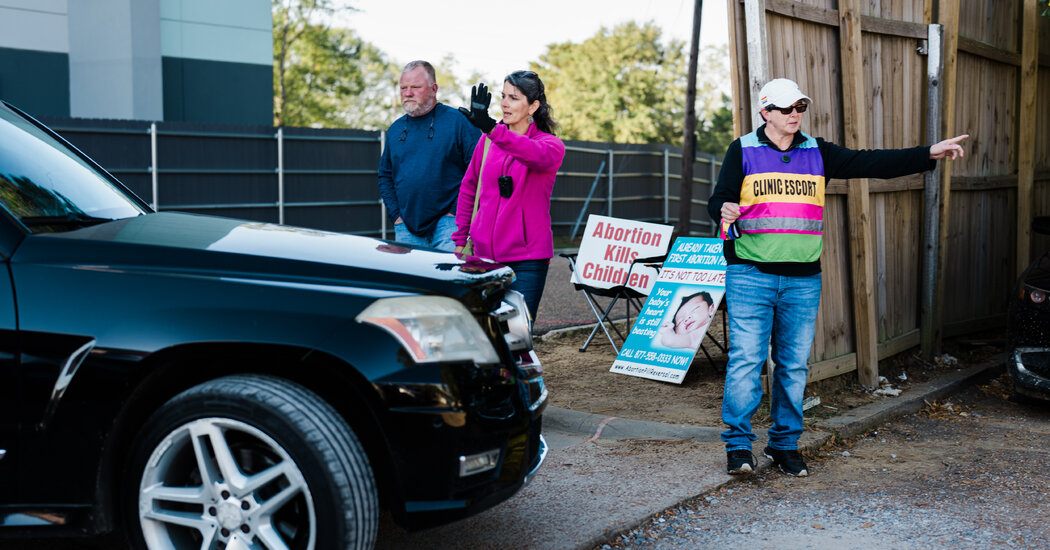
A leaked Supreme Court draft opinion that would overturn Roe v. Wade describes a United States not seen in half a century, in which the legal status of abortion is entirely up to the states. If the draft, from February and published Monday night by Politico, ends up being similar to the court’s final opinion, expected next month, reproductive rights will be rewritten almost immediately.
If Roe were overturned, would abortion become illegal everywhere in the U.S.?
No. Individual states would decide whether and when abortions would be legal. Many states would continue to allow them, and some have even begun making provisions to help serve women who live in states that are likely to restrict abortion. Right now, abortion remains legal in every state.
Where would abortion access be most likely to change?
Abortion would probably become illegal in about half of states, although forecasts differ.
According to the Center for Reproductive Rights, a group that fights abortion restrictions in court and closely tracks state laws, 25 states are likely to ban abortion if they are allowed to. Those states are: Alabama, Arizona, Arkansas, Georgia, Idaho, Indiana, Kentucky, Louisiana, Michigan, Mississippi, Missouri, Nebraska, North Carolina, North Dakota, Ohio, Oklahoma, Pennsylvania, South Carolina, South Dakota, Tennessee, Texas, Utah, West Virginia, Wisconsin and Wyoming.
The Guttmacher Institute, a research group focused on reproductive health care, says a slightly different group of states is likely to substantially limit abortion access: Its list of 26 states excludes North Carolina and Pennsylvania, but includes Florida, Iowa and Montana.
From Opinion: A Challenge to Roe v. Wade
Commentary by Times Opinion writers and columnists on the Supreme Court’s upcoming decision in Dobbs v. Jackson Women’s Health Organization.
Thirteen states have so-called trigger laws, which would immediately make abortion illegal if Roe were overturned. Some have old abortion laws on the books that were invalidated by the Roe decision but could be enforced again. Still other states, like Oklahoma, have abortion bans that were passed during this legislative session, despite the Roe precedent.
How would the number of U.S. abortions change?
Some women seeking abortions could obtain them in other ways, including traveling to a state where abortion is legal or ordering pills online from outside the country. Texas provides an example. In September, a law went into effect banning abortion after fetal cardiac activity is detected, around six weeks. Abortions at Texas clinics fell by half. But many women were able to obtain abortions in neighboring states or by ordering pills, resulting in an overall decline of only around 10 percent.
Without Roe, abortion would probably decline more because women would have to travel farther to reach a state where it was legal. Many women who get abortions are poor, and long travel distances can be insurmountable. The states likely to ban abortion are concentrated in the South, Midwest and Great Plains. Because of the expected increase in interstate travel, remaining clinics would most likely have less capacity to treat the women who were able to reach them.
Research from December on the estimated changes in distances to clinics found that, if Roe were overturned, the number of legal abortions would be likely to fall by around 14 percent (updated to 13 percent in more recent research). Our article from December explained that research and offered a map of where abortions were likely to decline the most.
Who has abortions now?
Under current law, around one in four American women would be expected to obtain an abortion at some point, according to research from the Guttmacher Institute.
They include women from all backgrounds. But statistics show women who receive abortions in the United States are more likely to be unmarried; to be in their 20s; to have low incomes; and to already have a child. They are disproportionately likely to be Black. They are more likely to live in a Democratic-leaning state.
Our article from December describes the demographics of the typical abortion patient.
Without Roe, how would the U.S. compare with the rest of the world?
The United States would join a very small group of countries that has tightened abortion laws in recent years, as opposed to loosening them. Three countries have done so since 1994: Poland, El Salvador and Nicaragua. In that period, 59 countries have expanded access, according to the Center for Reproductive Rights.
Under Roe, the United States is unusual in allowing abortion for any reason until around 23 weeks. Yet in many countries with earlier cutoffs, abortion is allowed for a wide variety of reasons, according to the center.
Sixty-six countries — home to about a quarter of women of reproductive age — prohibit abortion or allow it only if a woman’s life is in danger. Without Roe, certain states would align with these countries.
Our article from January explains international approaches to abortion law.
When would this happen?
Not right away. Abortion remains legal in every state for now, and each has at least one clinic.
The leaked document was described as a draft, not a final opinion. It may be a month or more before the Supreme Court officially rules in the case, and that decision could differ from the draft that is circulating.
If the Supreme Court does rule against Roe, clinics in some states would most likely begin closing within days. In other states that ban the procedure, the process may take several months.




